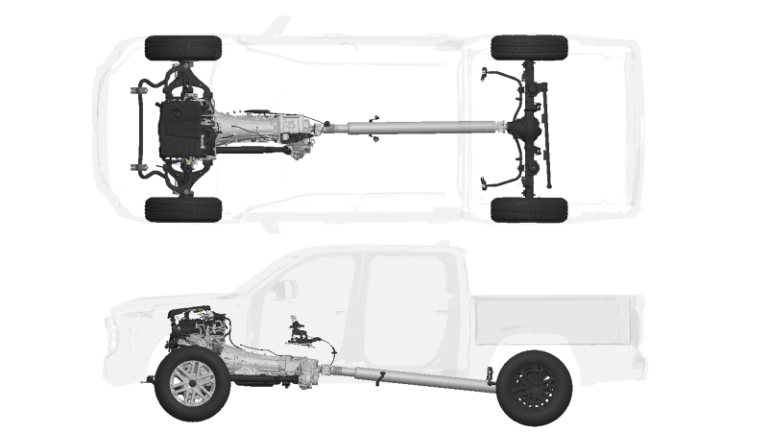The Automotive Engineer Cheatsheet
A blend between engineering and art, automotive engineering is a fascinating and rewarding field that offers many opportunities for growth and innovation. If you have a passion about cars then you might want to consider a career in automotive engineering! In this article, we’ll explore everything you need to know to succeed as an automotive engineer.

Automotive Engineer: Understanding the basics
First things first, what is automotive engineering? Automotive engineers are hired by manufacturers of cars, trucks, and parts to develop entire vehicles or specific components. Their responsibilities can include designing the engine, improving aerodynamics, enhancing performance and fuel efficiency, incorporating safety features, ensuring ergonomic design, and more.

The role of automotive engineers is to apply their knowledge and skills to develop new and improved vehicles that are safer, more efficient, and more comfortable for drivers and passengers. Automotive engineers work in different areas of the industry, such as product development, research, and development (R&D), creative design, validation, manufacturing, IT, and quality.
Automotive Engineer: Product Development Engineer
The biggest job function in any automotive company is product development. These are the engineers who are responsible for designing/ engineering all the sub-systems in a vehicle such as a vehicle suspension system or the body-in-white (vehicle structure). This is also the team who is responsible for the vehicle meeting its performance ans safety requirements such as range, aerodynamic performance or crashworthiness.

Automotive Engineer: Manufacturing Engineer
The second largest group in an automotive company is manufacturing. This is the team is who responsible for making sure the product development team is designing a vehicle that can be assembled for example ensuring that the vehicle meets ergonomics requirements for the operator and weldability requirements for the weld robots.

This team also is responsible for ensuring that each part of the vehicle can be manufactured regarless of manufacturing variablity. For example, metal parts must meet castability, forgeability, or formability requirements depending on what manufacturing process is being used to manufacture them. Finally this team also work hand in hand with all the automotive supplier if a quality spill is detected.
Automotive Engineer Salary
Salaries for automotive engineers can vary based on a variety of factors, including experience, education level, company, and geographic location. Working for an OEM such as General Motors, Ford, Toyota, or Honda usually pays more and provides better benefits than working for a supplier such as Magna, ZF, Denso, or Flex.
According to PayScale, the average salary for automotive engineers in the United States is around $88,430 per year + bonus, with some experienced professionals earning more than $120,000 per year + bonus. On top of that most automotive companies provide their employees with amazing benefits making automotive engineers highly paid professionals.
You pay will also vary based on numbers of experiance and the role you hold. Usually, individuals who work for automotive companies early on in their careers decide if they either want to be a technical specialist (TS) /subject matter expert (SME) or more of a program manager/ people leader.
How to become a Automotive Engineer
If you’re interested in pursuing a career in automotive engineering, the first step is to get the right education and qualifications. Typically, automotive engineers have a bachelor’s degree in mechanical engineering, electrical engineering, software engineering, or a related field. Most employers only require a bachelor’s degree, however, it is becoming more and more common to see candidates with master’s degrees especially if your ambitions are to move up the corporate ladder. The only time a candidate is expected to have a Ph.D. in engineering is if they plan to enter R&D.

Top 5 universities that automotive companies recruit from
From my personal experience, I can tell you that even though there are many great colleges and universities your chances of entering an automotive company will significantly increase if you choose the right college program. In the US, there are several top-ranked colleges and universities that offer excellent programs in this field that automotive companies activity recruit from. Here are some of the best automotive engineering college programs in the US which most large automotive companies activity recruit from:
- Massachusetts Institute of Technology (MIT) – The Department of Mechanical Engineering at MIT offers a Bachelor of Science in Mechanical Engineering with a concentration in automotive engineering.
- The University of Michigan – The Department of Mechanical Engineering at the University of Michigan offers several programs related to automotive engineering.
- Stanford University – The Department of Mechanical Engineering at Stanford University offers a Master of Science in Mechanical Engineering with a focus on automotive engineering.
- Kettering University – Kettering University is a private university in Flint, Michigan that specializes in engineering and technology.
- Michigan State University- Michigan State University (MSU) also offers a strong automotive engineering program that should be considered when looking at top programs in the US.
- Ohio State University – Ohio State University (OSU) is another excellent institution that offers a top-tier automotive engineering program.
- The Pennsylvania State University- The Pennsylvania State University (Penn State) is another top institution that offers a strong automotive engineering program.
These are just a few of the top automotive engineering college programs in the US. When choosing a program, it’s important to consider if the company you are trying to work for ACITIVLY RECURITES from the institution you are considering!
What to do if you are not enrolled in a university automotive companies activity recruit from, but you’re still interested in entering the automotive industry?
Great Question! As you might have read in my about me tab, I did not attend any of the universities listed above for my undergrad but I was still able to enter the auto industry. So if attending any of the universities listed above is not feasible or you are already enrolled in another engineering program my recommendation is to join an engineering professional organization.
Joining engineering professional organizations can offer numerous benefits for individuals pursuing a career in engineering. Some of the most significant benefits include:
- Networking: Professional organizations provide opportunities for members to connect with other professionals in their field, including industry leaders, peers, and potential employers. This can help individuals build relationships and expand their professional network, which can be invaluable in securing internships, jobs, and other opportunities.
- Professional Development: Many engineering organizations offer professional development resources, such as training workshops, mentorship programs, and leadership opportunities. These resources can help members build new skills, stay up-to-date on the latest trends and technologies in their field, and advance their careers.
- Access to Industry Information: Engineering organizations often provide members with access to industry-specific news, reports, and research. This can help members stay informed about important developments in their field and gain insights that can inform their work and career decisions.
- Career Support: Many engineering organizations offer job boards, career fairs, and other resources to help members find employment opportunities. Some organizations also offer scholarships and other financial support to help members pursue their educational and professional goals.
- Community Involvement: Engineering organizations often provide opportunities for members to get involved in their local communities through outreach and service projects. This can help members develop leadership skills, build relationships with community members, and make a positive impact in their area.
Engineering Societies
Some of the most popular engineering organizations include the Society of Automotive Engineers (SAE), the Society of Hispanic Professional Engineers (SHPE), the Society of Women Engineers (SWE), and the National Society of Black Engineers (NSBE). Joining one or more of these organizations can provide numerous benefits for individuals pursuing a career in engineering, including networking opportunities, professional development resources, access to industry information, career support, and community involvement.
Automotive companies attend events hosted by each of the 4 organizations listed above! So it’s a great way to get some visibility with the correct individuals who can open the door for you to become an automotive engineer.
The Key Skills and Knowledge Needed for Success in Automotive Engineering
To succeed as an automotive engineer, you need a combination of technical skills and knowledge, as well as soft skills and personal qualities. Let’s take a closer look at some of the key skills and knowledge you’ll need:
Technical Skills and Knowledge: Automotive engineers must have a strong understanding of mechanics, electronics, and software engineering. They must be proficient in math, physics, and computer science to design, develop, and test new systems and components. They must also be familiar with CAD software such as SolidWorks and NX, and FEA simulation tools like Abaqus. However, by far the most important skill is the ability problem solve! Thinking on your own two feet will enable you to apply what you learn in school to a real-world problem and make you a much stronger engineer.
Soft Skills and Personal Qualities: In addition to technical skills, automotive engineers must have strong communication, teamwork, and problem-solving skills. They must be able to work collaboratively with other engineers, designers, and technicians to develop new products and solve complex problems. They must also be adaptable, creative, and innovative, as the industry is constantly evolving and facing new challenges.

Emerging Trends and Technologies in Automotive Engineering
The automotive industry is rapidly changing, with new technologies and trends emerging every day. One of the most significant trends is the shift towards electric and autonomous vehicles. Automotive engineers must be familiar with the latest advances in battery technology, electric motors, and control systems to design and develop new electric vehicles. They must also be familiar with sensors, cameras, and other technologies used in self-driving vehicles to ensure they are safe and reliable.
Another trend in the industry is the growing demand for connected cars/software-defined vehicles (SDV). Automotive engineers must be able to develop systems that allow vehicles to communicate with each other and with external devices, such as smartphones and traffic lights. They must also be able to develop cybersecurity measures to protect these systems from cyber attacks.
Challenges and Opportunities in Automotive Engineering
While there are many exciting opportunities in automotive engineering, there are also some significant challenges facing the industry. One of the biggest challenges is the global competition from other countries, such as China and India, who are investing heavily in the industry. Another challenge is the changing regulations and standards for vehicle emissions and safety/ crashworthiness, which require automotive engineers to stay up-to-date with the latest requirements.
Despite these challenges, there are also many opportunities for automotive engineers. For example, the industry is always looking for new and innovative ways to improve vehicle efficiencies by way of mass reduction or implementation of more advanced and stronger engineering materials. Automotive engineers who can come up with creative solutions to these challenges will be highly valued in the industry.
Conclusion: Start Your Journey in Automotive Engineering Today!
In conclusion, automotive engineering is a fascinating and rewarding field that offers many opportunities for growth and innovation. Whether you’re interested in designing new cars, developing cutting-edge technology, or solving complex problems, there’s a place for you in this exciting industry. So, if you’re passionate about cars and technology, don’t hesitate to pursue a career in automotive engineering. With the right education, skills, and determination, you can succeed and make a difference in the world of transportation. Good luck!







Itís hard to come by knowledgeable people about this subject, but you sound like you know what youíre talking about! Thanks